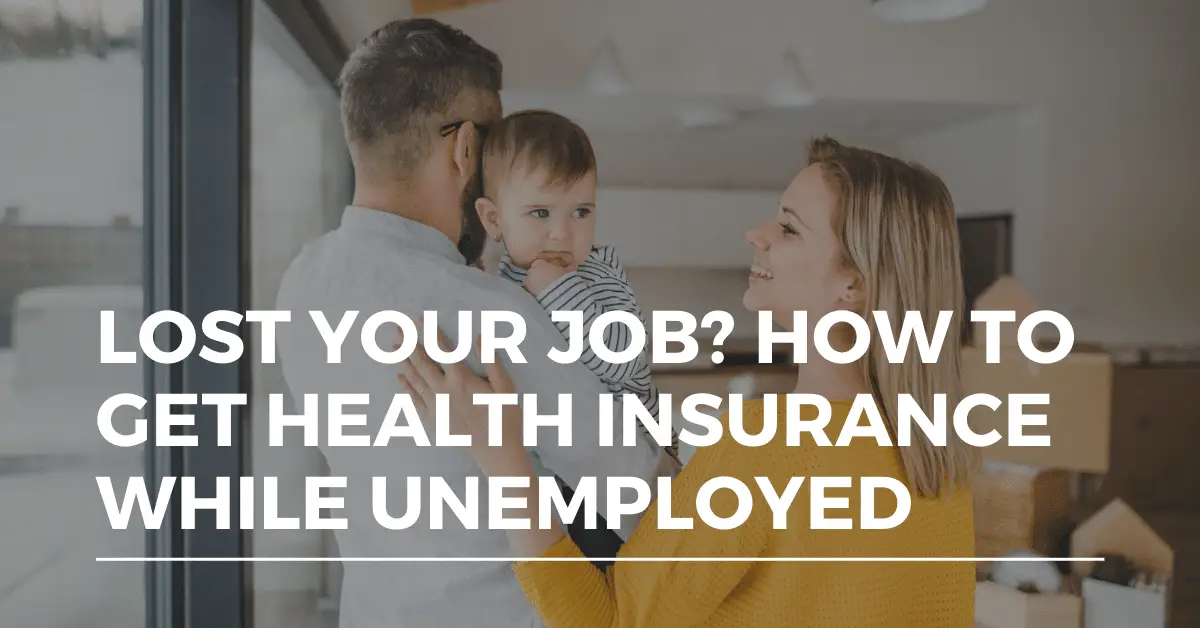For many people, a job does not only provide a paycheck. Steady employment also offers benefits, including health insurance. The Affordable Care Act (ACA), also known as Obamacare, makes it easier to get health insurance while unemployed.
Still, many people who lose their jobs may worry about getting health insurance while unemployed, especially if it was unexpected. If you find yourself without a job and in need of health care coverage, here are some options you might consider:
- COBRA health coverage
- Health insurance exchange plans
- Medicare or Medicaid
- Short term health insurance
We will cover each of these options in detail below.
COBRA Health Coverage
COBRA, which stands for Consolidated Omnibus Budget Reconciliation Act, is a law that helps people keep the same health insurance plan after they lose their job. COBRA coverage ensures that you get the same benefits without having to make changes.
COBRA may not always be the low-cost option, but it can ensure that your health benefits don’t change after a job loss.
COBRA is a good health coverage option if you have existing health conditions, and you want to make sure your treatments and health care is still available to you after you lose your job. COBRA may not always be the low-cost option, but it can ensure that your health benefits don’t change after a job loss.
COBRA continuation coverage can be helpful if you expect to find a new job relatively soon, and you merely want insurance for a short time between jobs. However, if you choose this option, you will want to see if other options, such as short-term insurance policies, are less expensive than COBRA.
One final reason to choose COBRA is if you are a student who is going to school. In many cases, you can qualify for COBRA and get the same benefits as you got under your parents’ family insurance coverage while you attend school.
Health Insurance Exchange Plans
Healthcare.gov provides access to healthcare exchanges. These exchanges offer competitive rates for health coverage. The Affordable Care Act set up these exchanges. The advantage of this health insurance marketplace is that you can look at multiple low-cost plans and find the best one for your needs.

Also, an insurance company that lists their plans on the exchange will need to price them competitively. Your monthly premiums will be reasonable because of the competition.
To list on the exchange, insurance companies need to follow the rules set out by the ACA, including not withdrawing health benefits because of a preexisting condition.
You can seek policies for individual coverage on exchanges, and you can also search for family plans. Some states run separate marketplaces, while others are part of the federal health insurance exchange. Some states have expanded options and assistance during the Coronavirus pandemic.
Another thing to note about state health insurance exchanges is that they may offer a subsidy. Federal and state programs provide financial assistance to lower health insurance costs. These subsidies usually depend on your income. For those purchasing family coverage, the income requirements may be higher than for individual health insurance plans.
Subsidies can also vary depending on the number of people in your family. You may also qualify for a tax credit for your premiums and health insurance spending in some cases.
You may need to weigh your health insurance options quickly. Some states allow you to apply for new coverage and change insurers during an open enrollment period. Depending on your state, you may need to apply during this open enrollment period to get full health benefits.
Medicare or Medicaid
Individuals with a low income may qualify for Medicaid. Currently, many states have expanded Medicaid coverage for low-income residents under the ACA. States offer health insurance coverage through Medicaid if you are below a specific annual income threshold, which varies from state to state.
Families can have higher income and still qualify for Medicaid, but they must include all household income when applying.
Because the ACA expanded these programs, more people now have Medicaid eligibility. Typically, you need to be below, at, or very near to the poverty level to get Medicaid coverage. However, some states offer subsidies for people who are not in a high-income bracket but do not qualify for Medicaid.
Medicare has stricter requirements. You need to be 65 or older unless you have specific diseases or qualify because of Social Security benefits or other public assistance forms.
Both of these are worthwhile options if you can qualify. In some cases, you may not meet income requirements while employed, but you could fall below the income threshold after a job loss.
Short-Term Health Insurance Coverage
Individuals may want to consider a short-term health insurance plan after a job loss. These plans could have very high deductibles.

However, if you only expect to be unemployed temporarily, and you want coverage for an emergency or to put your mind at ease during the Coronavirus pandemic, this option for individual health insurance could be useful for you.
This type of plan can protect you financially while you are uninsured, as an unforeseen health emergency could be costly otherwise. However, if you have a preexisting condition and need regular medical care, a short-term plan is not the best option for you.
Other Options for Health Insurance While Unemployed
Other options include finding health coverage from an organization, combining a high-deductible plan with a healthcare discount program, or seeking out special children’s health insurance programs to get benefits through your state for some of your family members.
Some professional organizations, societies, and nonprofit groups have group health insurance plans for members. You need to be a member, but you can qualify health insurance while unemployed.
Health discount cards offer discounts on prescriptions and health care that can make a high-deductible plan more reasonable. These discount programs are not a substitute for health insurance, however.
Some states may offer subsidies or plans for children. For example, children under age 18 may get free or discounted coverage if their parents meet income requirements.
Seeking health insurance while unemployed can be overwhelming. However, by doing your research and carefully weighing all your options, you can find the right plan for you and your family until you’re employed once again.
